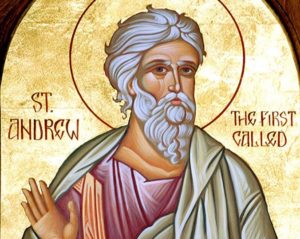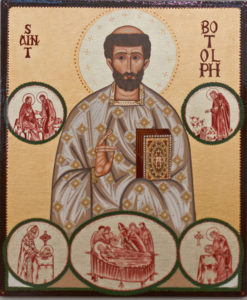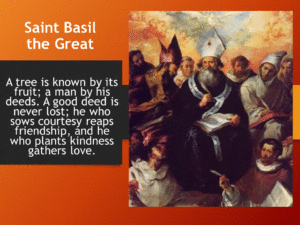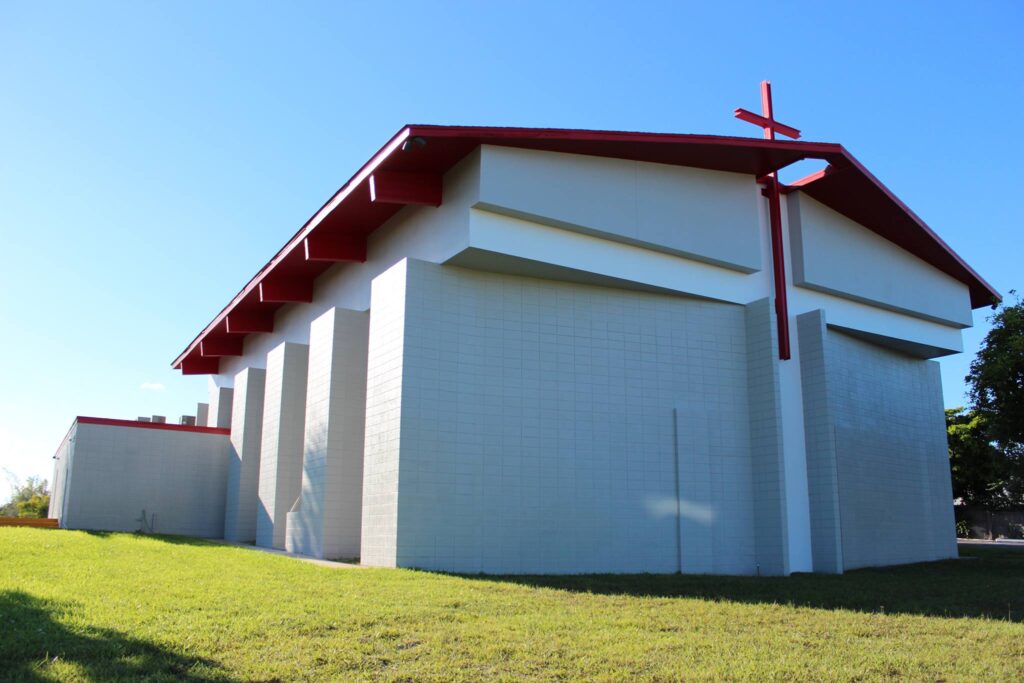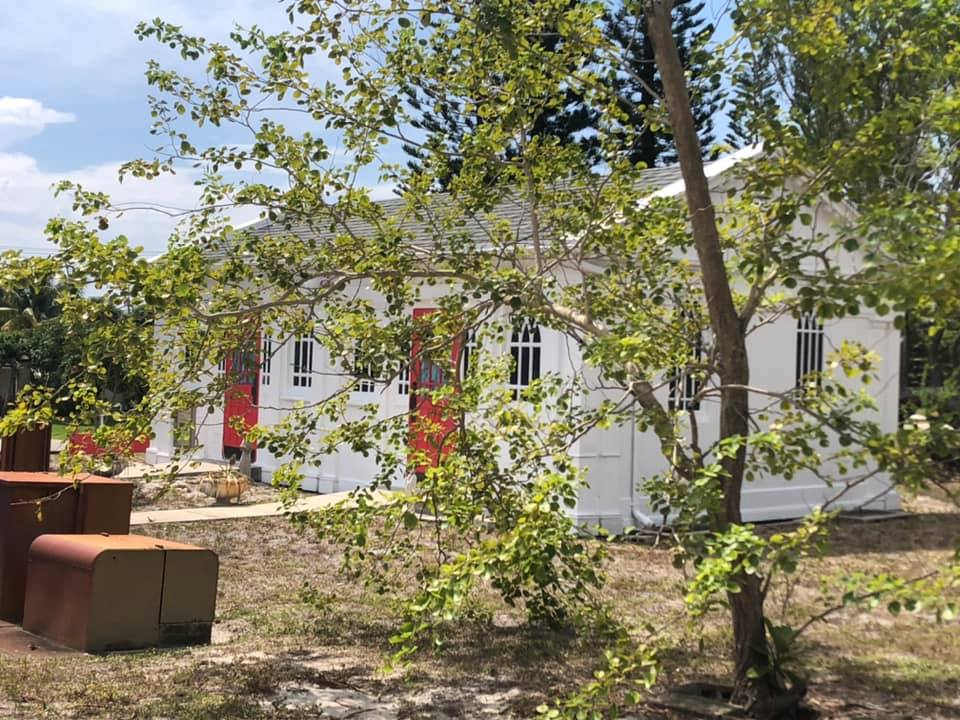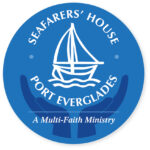Saints for the month
April
4 – Isidore of Seville
11 – Leo the Great
14 – Justin, Martyr
21 – Anselm, Archbishop of Canterbury
23 – George, Martyr
25 – Mark, Evangelist
29 – Catherine of Sienna
[su_divider]
May
1 – Philip and James, Apostles
2 – Athanasius, Bishop of Alexandria
3 – Invention (Finding) of the Holy Cross
4 – Monica
6 – John before the Latin Gate, Apostle and Evangelist
7 – Stanislas, Bishop and Martyr
9 – Gregory of Nanzianzus, Bishop, Confessor and Doctor
19 – Dunstan, Monk and Archbishop
20 – Bernardin of Siena, Confessor
26 – Augustine of Canterbury
27 – Bede the Venerable
[su_divider]
June
5 – Boniface, Bishop and Martyr (R)
9 – Columba, Abbot (W)
10 – Margaret of Scotland (W)
11 – Barnabas the Apostle (R)
13 – Anthony of Padua (W)
14 – Basil the Great, Bishop, Confessor and Doctor (W)
18 – Ephraem of Syrus, Deacon, Confessor and Doctor (W)
22 – Alban, Protomartry of England (R)
24 – Nativity of John Baptist (W)
28 – Iraeneus, Bishop and Martyr (R)
29 – Peter and Paul, Apostles (R)
30 – Commemoration of Paul (R)
[su_divider]
July
1 – Precious Blood of our Lord (R)
2 – Visitation of the Blessed Virgin Mary (W)
7 – Cyril and Methodius (W)
14 – Bonaventure (W)
19 – Vincent de Paul (W)
20 – Margaret (R)
22 – Mary Magdalene (W)
25 – James, apostle (R)
26 – Anne, Mother of the Blessed Virgin Mary (W)
29 – Martha (W)
31 – Ignatius of Loyola (W)
[su_divider]
August
1 – Peter’s Chains (R)
3 – Invention of Stephen (R)
4 – Dominic (W)
6 – Transfiguration (W)
7 – Holy Name of Jesus (W)
10 – Lawrence, Martyr (R)
12 – Clare, Virgin (W)
15 – Assumption of the Blessed Virgin Mary (W)
16 – Joachim, Father of the Blessed Virgin Mary (W)
20 – Bernard of Clairvaux (W)
21 – Jane Francis de Chantel (W)
24 – Bartholomew, Apostle (R)
25 – Louis, King of France
28 – Augustine of Hippo (W)
29 – Beheading of John the Baptist (R)
31 – Aidan (W)
[su_divider]
September
2 – Stephen (W)
8 – Nativity of the Blessed Virgin Mary (W)
14 – Exaltation of the Holy Cross (R)
16 – Cyprian, Bishop and Martyr (R)
19 – Theodore (W)
21 – Matthew, Apostle & Evangelist (R)
27 – Cosmas & Damian (R)
29 – Michael & All Angels (W)
30 – Jerome (W)
[su_divider]
October
1 – Remigius (W)
2 – Guardian Angels (W)
4 – Francis of Assisi (W)
6 – Bruno (W)
9 – Denys, Rusticus & Eleutherius (R)
13 – Edward the Confessor (W)
15 – Teresa of Avila (W)
18 – Luke the Physician (R)
24 – Raphael the archangel (W)
28 – Simon and Jude (R)
November
1 – All Saints Day (W)
2 – All Souls Day (B)
4 – Charles Borromeo (W)
7 – Willibrord of Frisia (W)
11 – Martin of Tours (W)
17 – Hugh of Lincoln (W)
19 – Elizabeth of Hungary (W)
21 – Presentation of the BVM
22 – Cecilia, Virgin (R)
23 – Clement of Rome (R)
24 – John of the Cross (W)
25 – Catherine of Alexandria (R)
30 – Andrew, Apostle (R)
[su_divider]
December
3 – Francis Xavier (W)
5 – Sabas, Abbot (W)
6 – Nicholas of Myra (W)
7 – Ambrose of Milan (W)
8 – Conception of the Blessed Virgin Mary (W)
13 – Lucy, Virgin and Martyr (R)
21 – Thomas, Apostle (R)
26 – Stephen, Protomartyr (R)
27 – John the Apostle(R)
28 – Holy Innocents (R)
29 – Thomas of Canterbury (R)
31 – Sylvester (W)
[su_divider]
(November 30): Andrew the Apostle
Saint Andrew was one of the twelve apostles. He lived in Capernaum where he made his living as a fisherman. He was the brother of Simon Peter and a follower of John the Baptist before becoming a disciple of Christ.
In the Gospels, we learn of him helping in the distribution of the loaves and fishes to feed the 5000, and for bringing certain Greeks to meet Jesus (John 12: 20-22).
The accompanying picture of Andrew was painted by the Spanish Mannerist painter El Greco (1541-1614)
There is no record as to where he was sent to proselytize following Our Lord’s ascension, but legend holds that it was Greece. He died around 60 A.D.
[su_divider]
(November 17): Hugh of Lincoln, Bishop & Confessor
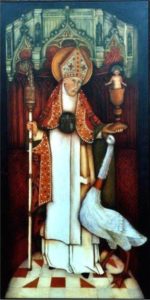 Hugh (C. 1135 – 1200) was born at Avalon in Burgundy. He became a monk at age 24 and later, at the request of King Henry II of England, was called to be the prior of the first Carthusian house in England, located in Somerset. Under his direction the house flourished, and he became the bishop of Lincoln, in 1186.
Hugh (C. 1135 – 1200) was born at Avalon in Burgundy. He became a monk at age 24 and later, at the request of King Henry II of England, was called to be the prior of the first Carthusian house in England, located in Somerset. Under his direction the house flourished, and he became the bishop of Lincoln, in 1186.
Under his bishopric, he chose learned men to help him govern, and he rebuilt his cathedral, held synods and visited the parishes of his diocese confirming, baptizing, and consecrating churches.
He was not afraid to excommunicate lay people who refused to recant their heretical views, nor to admonish kings, and would not appoint unbelieving men of wealth to church benefices.
Hugh was also fond of animals, and had a pet swan that he fed from his hand who would follow him about and even kept watch over him by night. Hence, his reliefs often show him with his pet swan standing at his feet. The accompanying picture is of the statue of Saint Hugh at the Saint Hugh of Lincoln Roman Catholic Church in Huntington Station, New York
Hugh encouraged his lay people to have a charitable heart, to be careful with the wiles of the tongue and to live chaste lives. May we, too, seek to follow his example and heed his admonitions.
[su_divider]
6/20/2017
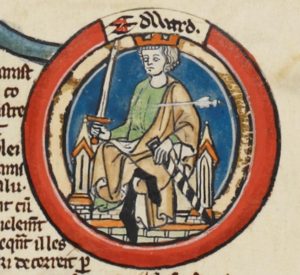 Translation of Saint Edward, King and Martyr.
Translation of Saint Edward, King and Martyr.
This Edward was the son of Edgar the Peaceful, King of all England. He was baptized by Archbishop Saint Dunstan of Canterbury, who fostered him in things spiritual, like as though he were his own son. When the lad was only thirteen years of age, King Edgar died, and his widow, who was Prince Edward’s stepmother, strove to set her own son Ethelred on the throne, which same was but seven years of age. But the chief men of the realm chose Prince Edward, in accordance with his father’s will. Thereupon the young King Edward submitted himself to the guidance of holy Dunstan, and other wise counsellors; and he grew in favour with God and man as he grew in stature, and so gave promise of great things. But the enemy of all good stirred up the stepmother to plot his death (for so it hath ever been believed) that her own son might reign in his stead.
Now when this excellent youth had reigned three years and eight months, it chanced that he went hunting one day in Warham Wood. And as he was fain to see his brother, whom he dearly loved, he went to the house of his stepmother which was hard by. Whereat they that were with him, took leave of him to continue their pastime, so that the King came alone to the house, suspecting no evil. And the wicked Dowager-queen rejoiced that she had gotten a fit time to carry out her evil desire, and welcomed him, and bade bring him refreshment. Thereupon, whilst he was drinking of the cup which had been offered, a courtier who had just given him the kiss of peace stabbed him with a dagger.
Then the King set spur to his horse, wherefrom he had not yet dismounted; but he soon fell from the saddle, with one foot caught in a stirrup, and thus he was dragged to death. It was on March 18th, 987, that the young King thus went to God. And his stepmother caused his body to be flung in a marsh; but it is said a great light revealed where it lay, whence it was taken and buried with honour. And afterwards, through the intercession of this holy youth in heaven, the stepmother repented, and built monasteries, into one of which she retired from the world, and did penance all the days of her life.
Collect
O GOD, who reignest in glory over an everlasting kingdom: we beseech thee mercifully to behold thy family, who on this day call to remembrance blessed Edward thy King and Martyr; and grant, that by his merits and intercession, they which now rejoice in his triumph may likewise attain to his reward in heaven. Through the same our Lord Jesus Christ, who liveth and reigneth with thee and the same Spirit ever, one God, world without end. Amen.
The Anglican Breviary, Frank Gavin Liturgical Foundation, Inc., New York, 1955, pages 1857-1858; 1877
Information source :http://www.anglicancatholic.org
[su_divider]
6/17/2017
Saint Botulph,Abbot.
Patron saint of travellers
Botulph, and his brother Adulph, both of whom are venerated as Saints, went as youths to Belgic Gaul, and there became monks. Adulph is said to have become a regionary bishop at Utrecht. Botulph in the course of time returned to England, and founded, about the year 654, a monastery at a place usually identified with Boston in Lincolnshire, for Boston is a corruption of Botulph’s Town. He was proclaimed far and wide as a man of remarkable life and learning, full of the grace of the Holy Spirit, and went to God about the year 680. And when the monastery was destroyed during the Danish invasion of the ninth century, his relicks, and those of Saint Adulph which had been enshrined with him, were saved, and later distributed among various great Minsters in England.
Collect
GRANT, we beseech thee, O Lord, that the prayers of thy holy Abbot, blessed Botulph, may commend us unto thee: that we, who have no power of ourselves to help ourselves, may by his advocacy find favour in thy sight. Through the same our Lord Jesus Christ, who liveth and reigneth with thee and the same Spirit ever, one God, world without end. Amen.
The Anglican Breviary, Frank Gavin Liturgical Foundation, Inc., New York, 1955, pages 1877
Information source: http://www.anglicancatholic.org
As the patron saint of travellers, four churches at the gates of the city took his name, our neighbour St Botolph without Bishopsgate, St Botolph without Aldersgate at the other end of the City and St Botolph without Billingsgate, which was destroyed in the Great Fire of London in 1666. On their way to and from the City people would stop and pray and give thanks for travelling mercies.
O God, by whose grace the blessed Abbot Botolph,
enkindled with the fire of your love,
became a burning and a shining light in your church;
grant that we may be inflamed
with the same spirit of discipline and love,
and ever walk before you as children of the light,
through Jesus Christ our Lord.
Amen.
[su_divider]


